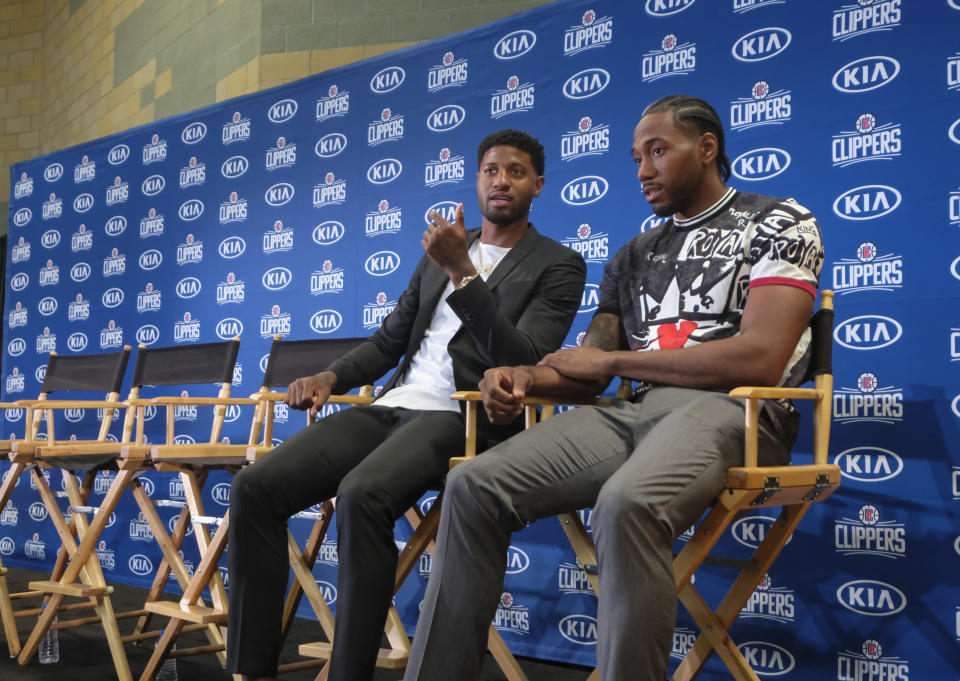NBA can try to limit tampering and player movement, but it may be too late
The forces that conspired to make two people not want the things they’ve always wanted: three trades from three small markets — San Antonio, Indiana and Oklahoma — that meant leaving over $100 million on the table, two highly competent organizations putting together season-long pitches, load management, an NBA championship in Toronto and a collective bargaining agreement (including the super-max contract) that incentivizes players staying put.
All that … and it didn’t work.
On Wednesday, Paul George and Kawhi Leonard took the podium together, as members of the Los Angeles Clippers. Paul’s detour even included spurning the Los Angeles Lakers last offseason to sign a four-year extension with the Thunder. But in the end, the gravitational tug of playing close to home, the Los Angeles market, the weather and the organization were too much.
At the news conference, they both talked about the appeal of the Clippers and playing close to home. George said playing with Leonard felt “destined.” For both, inking a deal in L.A. was clearly the fulfillment of a lifelong dream.
When it became clear that no star free agent was willing to pair up with Leonard in Los Angeles, Leonard reportedly contacted George and persuaded him to demand a trade, which is a violation of the NBA’s tampering rules. It’s worth noting, not only because rules were broken, but that despite their existence — and in the wake of an impending investigation into league-wide tampering through this free agency period — the two star players still ended up with everything they wanted.

Commissioner Adam Silver’s postseason news conference at the Las Vegas Summer League addressed the rise of player empowerment. “I think what's best for the fan is a 30-team league that everyone has the opportunity to compete with a fair set of rules. I think to the extent that the balance of power is out of whack a little bit, we should address it.”
The extent to which the NBA is truly concerned about tampering, rampant player movement and a landscape that will increasingly favor big markets is an open question. It’s been pretty good for business, after all. There’s also the question of what it can really do about it.
Seize every phone record, email and calendar invite and, sure, you’ll find evidence of league-wide foul play. You’ll also find that it resembles the modern working world: control tilted in favor of the people who bring home the bacon.
Give it enough time, and the right figure will force the issue to bend power in the direction of those who should wield it. LeBron James left Cleveland in 2010, endured a year and change of barbs and vilification, only to be vindicated and leave in his wake the realization that modern NBA fans will follow a player over a team. Jimmy Butler and Anthony Davis manhandled their way out of Minnesota and New Orleans, respectively, resulting in the termination of two general managers, leaving Thunder GM Sam Presti the wiser — and George more powerful — for it. George and the Thunder parted ways amicably, and Oklahoma City received a blue-chip prospect and multiple draft picks for its cooperation.
It’s hard to imagine the threat of losing a few more draft picks — a punishment the NBA could levy if it finds evidence of tampering — would have deterred the Clippers’ pursuit. I’m willing to bet owner Steve Ballmer, the richest owner in the NBA, would have wagered the multimillion dollar fine, too.
Anything more — like suspending Leonard or blocking George from joining the Clippers — would be borderline draconian, and the precedent would ultimately hurt the NBA. Imagine, for example, if Davis were blocked from joining the Lakers. Or if James, the face of the NBA, was suspended. It would be a PR nightmare, triggering the ire of the league’s most popular team. Big markets would be disproportionately punished, too, not because they’d break the rules more, but because they’d be more successful. And enforcing tampering rules won’t make marquee markets any less popular.
That doesn’t mean rule changes aren’t in order. As Silver put it: “It's pointless at the end of the day to have rules that we can't enforce. I think it hurts the perception of integrity around the league.” If one agent is negotiating on the behalf of an impending free agent by the NBA draft combine in May, every agent should have that right, for example.
But the NBA should take George, Leonard, Davis, Butler, and all the maneuvering outside the lines as a lesson: You can’t stop the natural order of things. The league’s best players — the reason we’re all here in the first place, the reason the NBA generates billions in revenue — like the people at the top of any industry, will feel entitled to the best of everything, and they’ll stop at nothing to get it.
More from Yahoo Sports:

